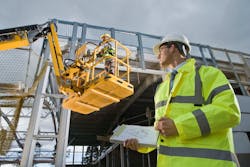MA Building Trades Council Calls for Statewide Suspension of Regular Construction Activity
Photo credit: iStock/Thinkstock
The executive board of the 75,000-member Massachusetts Building Trades Council voted unanimously to call on Mass. Gov. Charles Baker to declare a statewide suspension of all regular activity at construction sites beginning April 3 and continuing through April 30. The council is advocating that the only work the state government should permit to move forward should be emergency and certain essential work, such as:
- Emergency utility, road or building work, such as gas leaks, water leaks and sinkholes;
- New utility connections to occupied buildings;
- Mandated building or utility work;
- Work at public health facilities, health-care facilities and shelters, including temporary shelters and other facilities that support vulnerable populations;
- Work that ensures the reliability of the transportation network; and
- Other work necessary to render occupied residential buildings fully habitable.
Additional emergency/essential construction projects may be added on a case-by-case basis after joint review and approval by state and local officials.
“The council reached this decision after exhaustive consultation with public and private health experts, union contractors, union officials, construction industry partners, training directors and conversations with our members,” said Francis X. Callahan, president of the Massachusetts Building Trades Council. “All point to the only decision that can be made. The only way to protect the health and safety of our members, their families and of the general public is to keep people apart. It is impractical and, in many cases, impossible to safely work on a construction project right now given the current state of affairs.
“For these reasons we are calling on the government to issue a statewide suspension of all regular activity at construction sites in the Commonwealth of Massachusetts from April 3rd through April 30th. In the meantime, we are working around the clock with industry stakeholders and public health experts to develop best practices and new safety protocols to ensure the safest worksites possible for the emergency and essential projects that need to continue, and for all projects when it becomes feasible to return.”
